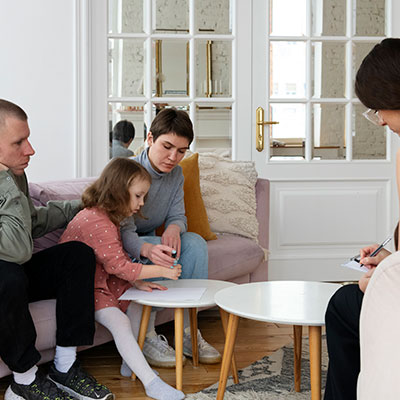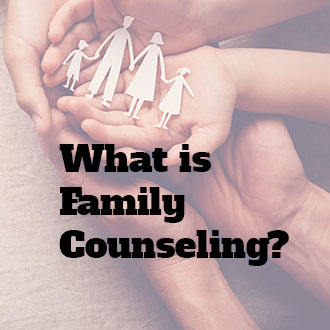Family Counseling Loveland CO
Family counseling in Loveland, CO, like in any other location, holds significant importance in promoting healthy family dynamics and addressing various challenges that families may face.
The Importance of Family Counseling
Here are several key reasons why family counseling is essential in Loveland, CO, and elsewhere:
Conflict Resolution:
Family counseling helps families address conflicts and disputes in a constructive and healthy manner. Loveland families, like any others, can experience disagreements and tensions. A trained family counselor can teach effective communication and conflict resolution skills, fostering better relationships within the family.
Improving Communication:
Effective communication is crucial for any family to function well. Family counseling can teach family members how to communicate openly and honestly, leading to better understanding and empathy within the family unit.
Child and Adolescent Issues:
Families in Loveland often seek counseling to address issues their children or teenagers may be facing, such as behavioral problems, school-related challenges, or emotional difficulties. Family counseling can provide support and strategies for parents to navigate these issues.
Blended Families:
In Loveland, as in many places, blended families are common. Family counseling can help these families navigate the complexities of step-parenting, building new relationships, and integrating different family structures.
Grief and Loss:
Families in Loveland, CO, may experience grief and loss due to various reasons, including death or divorce. Family counseling can provide a safe space for family members to process their emotions and support each other during difficult times.
Addiction and Substance Abuse:
Substance abuse can affect families anywhere, including Loveland. Family counseling can be a vital component of addiction treatment, helping families understand addiction, cope with its effects, and support their loved ones in recovery.
Mental Health Support:
Families may seek counseling when a family member is struggling with mental health issues like depression, anxiety, or bipolar disorder. Family counseling can help family members understand these conditions and develop strategies for supporting their loved one’s mental health.
Preventing Family Breakdown:
Family counseling can act as a preventive measure, helping families address issues before they escalate to the point of family breakdown or divorce. It can strengthen family bonds and prevent irreparable damage.
Cultural Sensitivity:
In a diverse community like Loveland, cultural differences can sometimes lead to misunderstandings and conflicts within families. Family counselors can provide culturally sensitive guidance to bridge these gaps.
Local Support:
Family counseling services in Loveland, CO, offer local residents a convenient and accessible resource for addressing their unique family challenges. It ensures that families receive support tailored to their specific community and cultural context.

What is Family Counseling
Family counseling is a therapeutic process that focuses on helping families navigate challenges, improve relationships, and achieve a healthier and more harmonious family dynamic. Its primary goal is to provide a safe and supportive environment where family members can openly communicate, address issues, and work collaboratively to find solutions.
The concept of family counseling recognizes that families are complex systems where each member’s thoughts, emotions, and behaviors are interconnected. It acknowledges that when one family member experiences difficulties or conflicts, it can impact the entire family unit. Therefore, family counseling aims to:
Improve Communication:
Effective communication is at the core of family counseling. Therapists facilitate open and honest discussions among family members, teaching them how to express their thoughts and emotions constructively. Enhanced communication leads to better understanding and empathy.
Resolve Conflicts:
Conflict is a natural part of family life, but unresolved conflicts can cause lasting damage. Family counseling helps identify the root causes of conflicts and provides strategies for resolving them peacefully. It encourages compromise and teaches conflict resolution skills that family members can use in their daily lives.
Enhance Relationships:
Family counseling works to strengthen family bonds and improve relationships. It encourages family members to build trust, empathy, and support for one another. Stronger relationships foster a sense of belonging and emotional well-being within the family.
Address Specific Issues:
Family counseling addresses a wide range of issues, including parenting challenges, behavioral problems in children or adolescents, addiction, mental health issues, grief and loss, and more. The therapist tailors the counseling process to meet the unique needs of each family.
Promote Healthy Coping Mechanisms:
Families may face stressors or crises, such as divorce, loss, or major life changes. Family counseling equips family members with coping strategies to deal with these challenges. It promotes resilience and adaptive responses to adversity.
Prevent Future Problems:
Beyond addressing current issues, family counseling aims to prevent future problems by teaching families valuable skills and fostering a supportive and nurturing environment. It acts as a preventive measure against further conflicts or breakdowns within the family.
Cultural Sensitivity:
Family counseling recognizes the cultural diversity within families and respects different cultural norms and values. It aims to bridge cultural gaps and promote understanding among family members from diverse backgrounds.
In summary, family counseling is a therapeutic approach that emphasizes collaboration, communication, and resolution of conflicts within a family unit. Its overarching goal is to empower families to overcome challenges, build stronger relationships, and enhance the overall well-being of each family member. By addressing issues at their roots and providing tools for positive change, family counseling seeks to create a more harmonious and supportive family environment.

The Importance of Professional Guidance for Family Counseling Loveland CO
Professional guidance for families in crisis is of paramount importance as it offers crucial support, expertise, and a structured approach to help families navigate the challenges they face during difficult times.
When a family is in crisis, whether due to issues like divorce, addiction, mental health challenges, or other crises, seeking the assistance of trained professionals can make a significant difference.
Firstly, professional guidance provides a neutral and safe space for family members to express their thoughts, feelings, and concerns without judgment. This environment allows for open communication and can foster understanding among family members who may be experiencing conflict or emotional turmoil.
Secondly, professionals in the field of family counseling or therapy bring specialized knowledge and techniques to the table. They can identify the root causes of issues, help family members recognize unhealthy patterns of behavior, and provide evidence-based strategies to address and resolve these problems. Their expertise can lead to more effective and lasting solutions.
Moreover, during a crisis, emotions can run high, making it challenging for family members to make rational decisions or communicate effectively. Professional guidance helps in facilitating productive discussions and decision-making processes. Therapists and counselors can mediate conflicts, offer coping mechanisms, and guide families toward healthier responses to crisis situations.
Additionally, professional guidance can prevent crises from worsening or recurring by equipping families with the tools and skills needed to cope with similar challenges in the future. It acts as a preventative measure, promoting long-term resilience and adaptability within the family unit.
The importance of professional guidance for families in crisis cannot be overstated. It provides a structured, expert-led approach to resolving issues, improving communication, and promoting healthier family dynamics. By seeking professional help during difficult times, families increase their chances of not only surviving the crisis but also emerging from it with stronger relationships and better-equipped to handle future challenges.

Unique aspects of family counseling in Loveland, CO.
Family counseling in Loveland, CO, like in any location, has its unique aspects and considerations that set it apart from counseling services in other places. Understanding these unique aspects can help families in Loveland make informed decisions about seeking professional help. Here are some of the unique aspects of family counseling in Loveland, CO:
Local Community Focus:
Family counseling in Loveland, CO, is rooted in the local community, and therapists often have a deep understanding of the specific challenges, values, and dynamics that families in Loveland may encounter. This local focus allows counselors to provide more targeted and culturally sensitive support.
Natural Setting:
Loveland is situated in a picturesque region of Colorado, known for its natural beauty. Family counseling in Loveland may incorporate the therapeutic benefits of the natural environment, such as outdoor counseling sessions or nature-based therapies, to promote emotional well-being and stress reduction.
Cultural Diversity:
Like many areas in Colorado, Loveland is home to a diverse population. Family counselors in Loveland are trained to work with families from various cultural backgrounds, respecting their unique traditions and beliefs while addressing their counseling needs.
Community Resources:
Loveland has a network of community resources, support groups, and organizations that family counselors can tap into to provide comprehensive care to their clients. These resources can be particularly helpful for families facing specific challenges like addiction, domestic violence, or grief.
Local Events and Stressors:
Family counselors in Loveland are attuned to local events, stressors, and trends that may impact families, such as economic fluctuations, regional social issues, or seasonal changes. This awareness allows counselors to tailor their approaches accordingly.
Holistic Approaches:
Colorado, in general, has a reputation for promoting holistic health and well-being. Family counseling in Loveland may integrate holistic approaches, including mindfulness, yoga, and other wellness practices, to address mental, emotional, and physical aspects of family health.
Outdoor Activities:
Loveland’s proximity to outdoor recreational opportunities like hiking, biking, and camping may be leveraged in family counseling sessions to encourage physical activity, bonding, and stress relief as part of the therapeutic process.
Community Support:
Loveland values community support, and family counseling services often collaborate with local schools, churches, and nonprofit organizations to provide holistic care and additional resources to families in need.
Rural Considerations:
Loveland is located in a region with a mix of urban and rural areas. Family counselors may be equipped to address the unique challenges faced by rural families, such as limited access to mental health services and the impact of rural living on family dynamics.
Family counseling in Loveland, CO, takes into account the local context, community resources, and the natural beauty of the region to offer tailored support to families facing a wide range of challenges. Counselors in Loveland are skilled in addressing both common family issues and those that may be influenced by the unique aspects of the local environment, culture, and community. This approach aims to promote the well-being and resilience of families in Loveland, fostering healthier and more harmonious relationships.

Personalized, Local Care at Breathe Counseling
At Breathe Counseling, we firmly believe that one-size-fits-all approaches have no place in family counseling. That’s why we invest time and effort in getting to know each family we work with on a personal level.
Our counseling sessions are highly individualized, focusing on the specific issues and goals that matter most to you and your loved ones. By tailoring our services to your unique circumstances, we ensure that you receive the support that truly meets your needs.
Our team of experienced counselors has deep roots in Loveland and the surrounding areas. They are well-versed in the local resources, networks, and support systems available to families.
This expertise allows us to provide holistic care by connecting you with additional community resources when needed, ensuring that you receive comprehensive support beyond our counseling sessions.
As a proud member of the Loveland community, we actively engage in community initiatives and partnerships. We believe in giving back and supporting the community that has embraced us.
Our commitment extends beyond the counseling room as we work collaboratively with local schools, organizations, and nonprofits to promote family well-being.
At Breathe Counseling, we don’t just provide family counseling in Loveland, CO; we become a trusted partner in your journey towards healthier, happier family dynamics.
Our commitment to personalized, local support is not just a promise but a way of life.
We invite you to breathe, relax, and embark on a transformative journey with us, knowing that you have a compassionate, community-minded team by your side, dedicated to your family’s well-being.

Common Family Issues Addressed in Counseling
Family counseling is designed to address a wide range of common family issues and challenges. These issues can vary in severity and complexity, but skilled family counselors are trained to help families navigate and resolve them. Some of the common family issues addressed in counseling include:
Communication Problems:
Poor communication can lead to misunderstandings, conflicts, and emotional distance within a family. Family counseling helps family members learn effective communication skills, active listening, and conflict resolution techniques to improve overall communication.
Parenting Challenges:
Parents often seek counseling to address issues related to parenting, such as discipline disagreements, parenting styles, and coping with the challenges of raising children, including adolescents.
Conflict Resolution:
Family conflicts, whether between parents, siblings, or other family members, can be disruptive and harmful. Family counselors help families identify the sources of conflict and develop strategies to resolve disputes peacefully and constructively.
Blended Family Issues:
Combining two families through marriage can be complex. Family counseling helps blended families navigate issues related to step-parenting, building relationships with stepchildren, and adjusting to new family dynamics.
Substance Abuse/Addiction:
Addiction can affect not only the individual but the entire family. Family counseling provides support and education for family members to understand addiction, set boundaries, and help their loved ones seek treatment.
Mental Health Challenges:
Families may seek counseling when a family member is dealing with mental health issues such as depression, anxiety, bipolar disorder, or schizophrenia. Family counseling can help families understand the condition, reduce stigma, and learn coping strategies.
Grief and Loss:
Coping with the death of a loved one or experiencing other forms of loss (e.g., divorce) can be emotionally challenging for families. Family counseling offers a safe space to grieve, process emotions, and support each other during these difficult times.
Trauma and Abuse:
Families affected by trauma or abuse may need specialized counseling to address the emotional scars and promote healing. Counselors can help survivors and their families rebuild trust and safety.
Behavioral Issues in Children/Teens:
Children and teenagers may exhibit behavioral problems or emotional challenges that impact family dynamics. Family counseling assists parents in understanding and managing these issues while fostering a supportive environment for the child or teen.
Family Transitions:
Major life transitions like relocation, retirement, or the birth of a new family member can create stress and adjustment issues. Family counseling helps families adapt to these changes and maintain healthy relationships.
Cultural and Identity Conflicts:
Families from diverse backgrounds may experience conflicts related to cultural differences, generational gaps, or identity issues. Family counseling promotes understanding, respect, and harmony within culturally diverse families.
Estrangement and Relationship Repair:
When family members become estranged or distant, family counseling can facilitate reconciliation and help rebuild fractured relationships.
Financial Stress:
Economic challenges can lead to stress and conflicts within families. Counseling can help families develop financial management strategies and cope with financial stressors together.
Addressing these common family issues through counseling can lead to improved communication, enhanced relationships, and a more supportive family environment. The goal of family counseling is to help families build resilience, develop healthy coping mechanisms, and navigate life’s challenges more effectively.
Read more about infidelity counseling in Fort Collins.

What to Expect During Family Counseling Loveland CO
During a family counseling session at Breathe Counseling, clients can expect a welcoming and supportive environment where their unique needs and challenges are addressed with care.
The session typically begins with introductions and a discussion of the session’s goals, creating a clear sense of purpose.
Confidentiality is emphasized to ensure that what is shared remains private, unless there is a risk of harm. Open and empathetic communication is encouraged, allowing each family member to express themselves openly and be heard.
The therapist conducts an initial assessment to understand the family’s dynamics and the issues they face, using this information to guide the counseling process.
Together, the therapist and the family set clear, achievable goals for the sessions. Depending on the family’s needs, the therapist introduces specific skills and techniques to improve communication, conflict resolution, and coping mechanisms. These skills are practiced during sessions and applied outside of therapy through homework assignments.
The counseling process involves exploring the root causes of family issues and addressing past experiences, family dynamics, and behavioral patterns.
Conflict resolution strategies are taught and practiced, helping family members navigate disagreements constructively. Emotional support is provided, creating a safe space for individuals to express their feelings and vulnerabilities.
Families may receive feedback on their progress, and their reflections on the counseling process are valued.
The therapist also assists the family in problem-solving, helping them identify potential solutions to their challenges and develop actionable plans.
Toward the end of the session, key points are summarized, homework assignments reviewed, and the next steps in the counseling process discussed. Scheduling future sessions is arranged as needed to ensure ongoing support and progress.
At Breathe Counseling, our therapists are dedicated to helping families improve their relationships, communication, and overall well-being through a respectful and collaborative approach in each counseling session.

Family Counseling Frequently Asked Questions
How does family counseling differ from individual counseling?
Family counseling and individual counseling are distinct therapeutic approaches, differing in their focus and methods.
Family counseling centers on the dynamics and relationships within a family unit, addressing issues that affect the family as a whole, such as communication problems or conflicts. It involves multiple family members attending sessions together, with a focus on improving communication, resolving conflicts, and strengthening family bonds.
Family counselors often view problems through a systems perspective, exploring how individual behaviors impact the entire family. In contrast, individual counseling centers on the personal experiences and well-being of a single individual. It involves private sessions where clients work on personal growth, self-exploration, and addressing specific mental health concerns.
The therapeutic goals in individual counseling are self-directed, with clients setting their own objectives. While family counseling aims to improve family dynamics and relationships, individual counseling focuses on the client’s mental health and personal development, using various therapeutic approaches tailored to their needs.
How do I know if my family needs counseling?
Recognizing the need for family counseling can be pivotal in addressing underlying issues and enhancing family well-being.
Several indicators may suggest that a family could benefit from professional counseling.
Persistent and intense conflicts within the family, along with difficulties in resolving these issues, can signify the necessity of therapeutic intervention.
Similarly, communication breakdowns, marked by frequent misunderstandings or strained interactions, may highlight the need to develop healthier communication skills.
Challenges in parenting, such as disagreements on strategies or behavioral issues in children, may also warrant family counseling.
Life transitions like divorce, remarriage, or the arrival of a new family member can introduce stress and tension, making counseling valuable in navigating such changes.
Mental health concerns within the family, substance abuse issues, grief, or loss can also point to the benefits of counseling.
Behavioral changes in a family member, emotional disconnection, or a sense of isolation within the family are additional signs that professional support may be helpful.
Furthermore, some families proactively seek counseling as a preventative measure to acquire tools and strategies for building resilient relationships and addressing future challenges. If any of these signs resonate with your family’s experience, considering family counseling can be a constructive step towards fostering healthier family dynamics and relationships.
Is Family Counseling Confidential?
At Breathe Counseling, we hold the confidentiality and privacy of our clients in the highest regard.
Our commitment to maintaining confidentiality in family counseling is unwavering. So, when you engage in family counseling with us, you can trust that what is discussed within the therapeutic setting remains strictly confidential.
Information shared by each family member during sessions is protected and will not be disclosed to anyone outside the counseling relationship, unless there is a risk of harm to oneself or others.
Our primary goal is to create a safe and trusting environment where families can openly explore their thoughts, feelings, and concerns without fear of judgment or breach of privacy.
Bottom Line: You can rest assured, your confidentiality is a cornerstone of our practice, ensuring that you can freely work towards improving your family dynamics and overall well-being.
How many sessions are necessary for effective family counseling?
The number of sessions required for effective family counseling can vary widely depending on several factors:
The Nature of the Issues:
The complexity and severity of the family’s issues play a significant role. Some families may require only a few sessions to address a specific issue, while others with more deep-seated or longstanding concerns might need longer-term therapy.
Family Dynamics:
The family’s ability to engage in the therapeutic process and make changes can influence the duration of counseling. Families that actively participate and apply strategies learned in therapy may see faster progress.
Therapeutic Approach:
The therapeutic approach used by the counselor can impact the number of sessions needed. Some approaches are more short-term and solution-focused, while others are longer-term and focused on deeper exploration and understanding.
Client Goals:
The family’s goals and objectives for counseling also play a role. If the family seeks a specific outcome, such as resolving a single issue or improving communication, it may require fewer sessions than families with broader goals.
Consistency:
Regular attendance and consistency in attending counseling sessions can expedite progress. Missed sessions or long gaps between appointments can slow down the therapeutic process.
External Support:
Families that have strong support systems outside of counseling, such as access to community resources or support groups, may require fewer sessions as they can continue their progress beyond therapy.
In many cases, family counseling begins with an assessment phase to understand the family’s needs and goals. Based on this assessment, the therapist and family will collaboratively develop a treatment plan, which may include an estimate of the number of sessions needed. However, it’s essential to keep in mind that flexibility is key in family counseling. The therapist will continuously assess progress and adjust the treatment plan as necessary.
In summary, there is no fixed number of sessions that applies to all families in family counseling. The duration of therapy varies depending on the unique circumstances and goals of each family. Some families may find significant improvement in just a few sessions, while others may benefit from longer-term therapy to achieve lasting positive changes. Ultimately, the effectiveness of family counseling is determined by the family’s willingness to engage in the process and the guidance of a skilled therapist.

